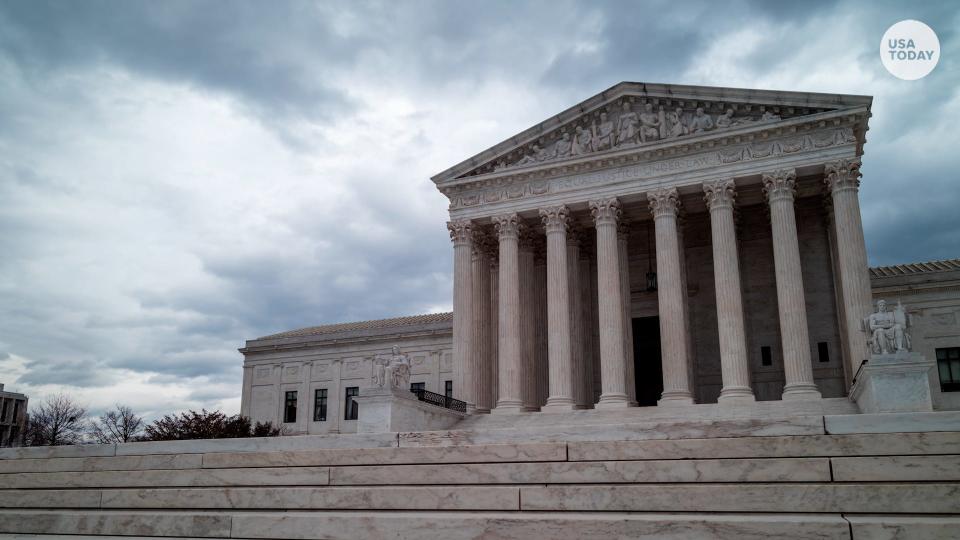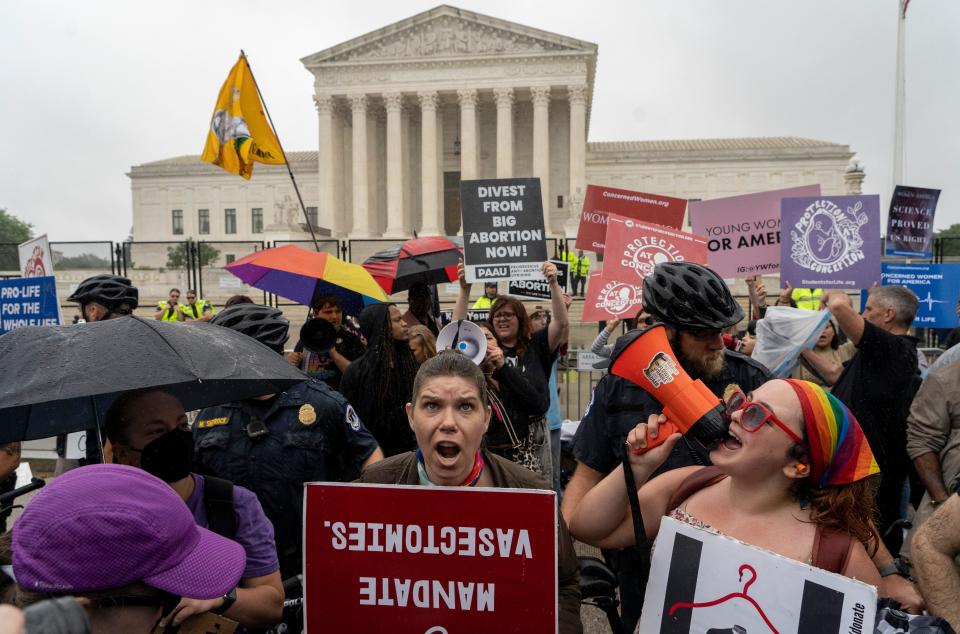Overturning Roe v. Wade undermines the legitimacy of the Supreme Court
- Oops!Something went wrong.Please try again later.
By a 6-3 vote, the Supreme Court overturned the 49-year-old precedent of Roe v. Wade, and the 30-year-old precedent in Planned Parenthood v. Casey.
The May 2 leak of Justice Samuel Alito’s draft opinion had foreshadowed the ruling and remained substantively unchanged.
The final ruling, issued Friday morning, strikes a major blow to the Supreme Court as an institution and threatens its future legitimacy.
Here's why: Taking away a constitutional right is extraordinarily rare. The arc of Supreme Court history in constitutional rights bends unmistakably toward their expansion.
My mom had an abortion almost 50 years ago. My family is finally talking about her decision.
Brown v. Board of Education stands out. That 1954 watershed ruling overturned segregation in public schools for Black children, undercutting the Supreme Court’s 1896 decision in Plessy v. Ferguson. Plessy upheld the segregationist fallacy that racially separate train passenger cars can be equal.
From marriage to contraception
There are scores of other examples. In Loving v. Virginia, the Court in 1967 struck down laws barring interracial marriage. The 2015 decision in Obergefell v. Hodges affirmed gay peoples’ constitutional rights to marry.

Let’s skip the academic debate about whether the Supreme Court has ever eradicated a constitutional right. Friday's Dobbs v. Jackson Women's Health Organization decision will affect millions of people and threatens freedoms for women. From the early 20th century, more than 15 cases had steadily expanded women's rights.
As the three dissenting justices write, "One result of (Friday's) decision is certain: the curtailment of women's ... status as free and equal citizens."
In 1965, the Supreme Court issued its landmark decision in Griswold v. Connecticut, recognizing a constitutional right to privacy that encompassed a right to contraception for married couples. The Supreme Court reasoned that decisions about such an intimate and personal matter as childbearing are constitutionally protected.
In 1973, future Supreme Court Justice Ruth Bader Ginsberg successfully argued Frontiero v. Richardson. The decision invalidated a federal statute that required female military members to obtain housing benefits for their spouses, to show they were dependent on their husbands. Meanwhile, males were automatically entitled to housing benefits for their wives.
Dobbs abandons the constitutional values Ginsburg fought for during her storied legal career.
Not just abortion: Overturning Roe v. Wade puts your right to conceive babies at risk, too
What's next for the Supreme Court
Gay rights could also be on the chopping block. Alito’s opinion calls abortion unique and asserts that Dobbs endangers no other rights. The 90-day warranty on that sales pitch could easily expire before the first decision of the Supreme Court’s next term.
The two primary rationales for overturning Roe were that abortion is not mentioned in the Constitution and that "the right to abortion is not deeply rooted in the Nation’s history and tradition." Neither are marital rights for gay people.
In his concurring decision, Justice Clarence Thomas says Obergefell, the marriage equality decision, is “demonstrably erroneous.” He says the same about Griswold, the contraception rights case.

During his 2006 Supreme Court confirmation hearings, Justice Alito recognized that Roe was a precedent reaffirmed again and again. Then he added, "It would be wrong for me to say to anybody bringing (a challenge to Roe), 'If you bring your case ... I'm not even going to listen to you. I've made up my mind. ... Go away.' "
Make no mistake. Other “unenumerated” rights such as gay marriage are at risk.
Clear and consistent: Clarence Thomas' principles showcase how he approaches big matters of constitutional law
The Supreme Court has squandered its legitimacy. In the seminal 1803 case Marbury v. Madison, Chief Justice John Marshall established federal courts’ authority to "say what the law is."
Courts have no army. Their authority depends entirely on the American people’s acceptance of their legitimacy.
After the public learned that Dobbs would overturn Roe, it sent public trust in the Supreme Court into a tailspin. A Gallup poll released Thursday shows that the number of Americans who have a "great deal" or "quite a lot" of confidence in the court has dropped 11 points from 36% to 25% in a year.
Polls confirm that more than 6 in 10 Americans wanted Roe to stay.
How the Supreme Court can maintain its authority
To maintain its authority, the Supreme Court needs citizens to believe that whatever partisan or personal views the justices hold, the result, in any case, will follow the law.
Columnist Ingrid Jacques: States will now decide abortion laws. Here's why that could be a good thing.
Notably, in Roe, five justices appointed by Republican presidents were among the seven justices who voted to establish a constitutional right to abortion. In Casey, three justices appointed by Republicans authored and signed the lead opinion. The irrelevance of party affiliation to the outcome built public trust. We’ve lost that.
We’ve also lost the legitimacy that comes from judges adhering to established rules.
The Dobbs majority reflect the opposite. They abandon stare decisis – the core judicial principle of reverence for precedent. It is vital to stability in law and society. In his concurrence that resembles a dissent, Chief Justice John Roberts acknowledges Friday's decision as “a serious jolt to the legal system."
There’s also the conservative jurisprudential principle that Justice Louis Brandeis helped establish in the 1930s: Courts should decide only the narrow question presented to them, not reach out to resolve broader social issues.
Roberts’ concurrence emphasizes that all the Supreme Court had before it was Mississippi’s 15-week ceiling on abortion rights. That ceiling, and no more, he writes, is what the court should have upheld "out of adherence to a simple yet fundamental principle of judicial restraint."
Violating established judicial precepts points to a majority ready to sacrifice principle to serve an ideological agenda. This Supreme Court is moving to destroy not only rights, but also itself.

Dennis Aftergut is a former federal prosecutor who has argued successfully in the Supreme Court. He is currently of counsel to Lawyers Defending American Democracy.
You can read diverse opinions from our Board of Contributors and other writers on the Opinion front page, on Twitter @usatodayopinion and in our daily Opinion newsletter. To respond to a column, submit a comment to letters@usatoday.com.
This article originally appeared on USA TODAY: Roe v. Wade is overturned. The Supreme Court is losing respect.

